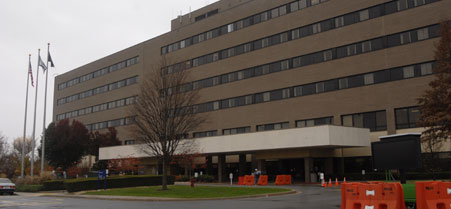VA not budging on plans to electronically track hospital staff
 The system would likely affect staff at the Martinsburg VA Medical Center in Martinsburg, W. Va.
The system would likely affect staff at the Martinsburg VA Medical Center in Martinsburg, W. Va.
The Veterans Affairs Department still intends to use its planned $550 million Real-Time Location System to track hospital staff with electronic tags and said it will have the support of labor union partners, according to the final request for proposals released Jan. 6.
Susan Anderson, president of the National Association of Government Employees local at the Martinsburg, W. Va., Veterans Affairs hospital and a member of the labor-management VA National Partnership Council, scoffed at this language in the RFP.
"Management gets very delusional at times. NAGE will never support tracking members," Anderson said in an email to Nextgov .
NAGE has not had any in-depth discussions with management on RTLS since last summer and the unions have requested that the subject be placed the agenda next week during the union's quarterly meeting with the department Jan.17-19, Anderson said. VA did not respond to a query sent Tuesday for comment.
VA plans to use the Wi-Fi system installed in its 152 medical centers augmented with ultrasound and infrared technology to track people and objects equipped with wireless tags. The system has an accuracy of 1 meter. Among other things, VA wants to increase staff productivity with the new system.
The department plans to deploy 80,000 tags in each hospital and 3,000 tags in each of its seven mail-order pharmacies, which collectively processed 107 million prescriptions in 2010.
Hospital staff will wear tracking tags on their badges. VA said, "care delivery and process flows can be improved upon through the use of real-time data and back-end analytics that track the location and movement of hospital staff and patients."
Department officials also intend to use RTLS to track a variety of equipment in hospitals, including surgical equipment, to help determine whether it has been sterilized. In June 2009, the department's inspector general reported that VA hospitals in Georgia and Florida failed to properly sterilize endoscopes before reuse for colonoscopies, potentially exposing thousands of veterans to HIV and other infections.
VA said RTLS will be so accurate it can identify each instrument placed on surgical trays used by doctors for an operation. Anderson said RTLS "seems like a great tool" for tracking equipment.






